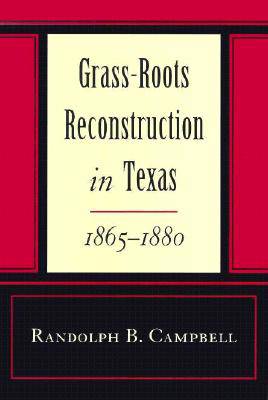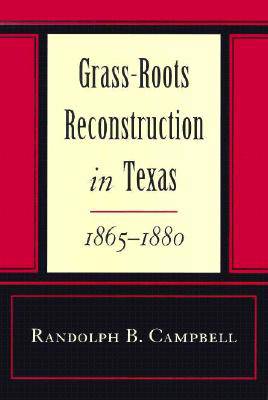
- Afhalen na 1 uur in een winkel met voorraad
- Gratis thuislevering in België vanaf € 30
- Ruim aanbod met 7 miljoen producten
- Afhalen na 1 uur in een winkel met voorraad
- Gratis thuislevering in België vanaf € 30
- Ruim aanbod met 7 miljoen producten
Zoeken
€ 56,45
+ 112 punten
Omschrijving
Although many historians have studied Reconstruction, few have sought to determine how the turbulent era of reunification and readjustment after the Civil War was played out on a local level. In this groundbreaking work, award-winning historian Randolph B. Campbell examines six Texas counties during that period, revealing a diversity of experience that challenges popular generalizations.
The counties Campbell explores--Dallas, Colorado, Harrison, Jefferson, McLennan, and Nueces--represent the various regions of Texas and thus its considerable geographic, economic, and demographic diversity. He ponders how the major post-Civil War policies, shaped in Washington and Austin, were interpreted in these outlying areas and thoughtfully measures the degree of change they brought to the lives of all residents--conservative whites, Republicans, and freedmen. Reconstruction at the grass roots in Texas, Campbell asserts, varied greatly from county to county, depending on such factors as demography, economic growth, and the extent of federal intervention. In the case of Texas, and possibly other states as well, Campbell concludes, assumptions about Reconstruction need to be qualified to recognize the distinct ways in which various localities experienced the period. Campbell also dispels common conceptions about Reconstruction, maintaining that whites were hurt far less than is often claimed and that at least one generation of African Americans bene-fitted a good deal more than is often recognized. Campbell's compelling work is the first systematic examination of Reconstruction at the county level. It provides convincing evidence for useful, general conclusions about how local conditions determined the way in which most citizens dealt with Reconstruction and its pivotal issues that forever shaped their state's politics and society.Specificaties
Betrokkenen
- Auteur(s):
- Uitgeverij:
Inhoud
- Aantal bladzijden:
- 252
- Taal:
- Engels
Eigenschappen
- Productcode (EAN):
- 9780807121948
- Verschijningsdatum:
- 1/02/1998
- Uitvoering:
- Hardcover
- Formaat:
- Genaaid
- Afmetingen:
- 162 mm x 237 mm
- Gewicht:
- 607 g

Alleen bij Standaard Boekhandel
+ 112 punten op je klantenkaart van Standaard Boekhandel
Beoordelingen
We publiceren alleen reviews die voldoen aan de voorwaarden voor reviews. Bekijk onze voorwaarden voor reviews.











